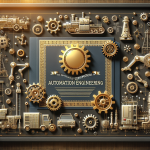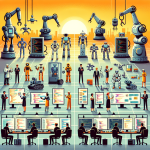As we transition into a new era defined by technological advancements, the conversation around job markets increasingly revolves around automation. In 2023, industrial automation jobs are not only growing but are also transforming the landscape of employment, presenting a myriad of opportunities for skilled workers and businesses alike.
The Landscape of Industrial Automation
Industrial automation refers to the use of various control systems for operating equipment in factories, boilers, heating, and ventilation, switchgear, machinery, processes in chemical plants, and other applications. With advancements in robotics, Artificial Intelligence (AI), and the Internet of Things (IoT), industries are experiencing a significant shift. This transition is fueled by a need for increased efficiency, reduced operational costs, and improved safety standards.
The Growth of Automation Technologies
In recent years, industries such as manufacturing, logistics, and supply chain management have increasingly adopted automation technologies to remain competitive. According to a report by McKinsey, it is estimated that automation could displace around 70 million jobs by 2030, but it is also anticipated to create more than 20 million new jobs in automation and technology sectors.
This shift is primarily driven by:
-
Increased Productivity: Automated systems enhance productivity by performing repetitive tasks with speed and precision.
-
Cost Efficiency: Businesses can save on labor costs and minimize human error through automation.
- Enhanced Safety: Automation reduces workplace hazards by taking on dangerous tasks, leading to safer work environments.
The New Job Landscape
As industries evolve, so do the roles and responsibilities of the workforce. Here are some key areas where job opportunities are emerging:
1. Robotics Technicians and Engineers
As robotic technology becomes more prevalent, there’s a substantial increase in demand for technicians and engineers who can design, build, and maintain robotic systems. These professionals ensure that robots operate efficiently and safely in various industrial settings.
2. AI and Machine Learning Specialists
AI is at the heart of many automation solutions. Specialists in AI and machine learning are crucial for developing systems that can analyze data, make decisions, and learn from their environments. These roles require a strong foundation in mathematics, computer science, and data analysis.
3. Automation Analysts
Automation analysts focus on identifying processes that can benefit from automation. They analyze workflow, measure productivity, and recommend solutions that can enhance operational efficiency. This role requires analytical skills and a deep understanding of both business processes and technology.
4. IoT Specialists
The integration of IoT in industrial settings has opened up new job prospects. IoT specialists work on connecting machines and systems to the internet, enabling real-time monitoring and data collection. This role is critical for companies looking to embrace the data-driven approach to operations.
5. Cybersecurity Experts
With increased connectivity comes the heightened risk of cyber threats. Specialists in cybersecurity are essential for protecting automated systems and sensitive data from potential breaches. This field is vital as more companies digitize their operations.
Skills for the Future
With the rise of these new roles, the skill sets required are also evolving. Workers in the automation sector will need:
- Technical Proficiency: A strong background in engineering, programming, and systems integration is vital.
- Analytical Thinking: The ability to analyze data and make informed decisions based on findings is crucial.
- Adaptability: As technologies evolve, the willingness to learn and adapt is essential for career growth.
- Collaboration Skills: Working alongside machines and in teams will be integral in an automated environment.
Education and Training
To meet the demand for skilled workers, educational institutions and training programs are adapting curricula to include automation and technology-related courses. Vocational training, certifications in robotics, automation systems, and participating in relevant workshops will be pivotal in preparing the workforce for these emerging opportunities.
Conclusion
As we navigate through 2023, the rise of industrial automation jobs presents a unique chance to unlock potential for workers and businesses alike. The technological revolution is reshaping industries, and embracing this change can lead to a more efficient, innovative, and safer work environment. For aspiring professionals, now is the time to equip themselves with the necessary skills and seize the opportunities that industrial automation has to offer. The future is bright, and those who adapt will thrive in this new landscape.




